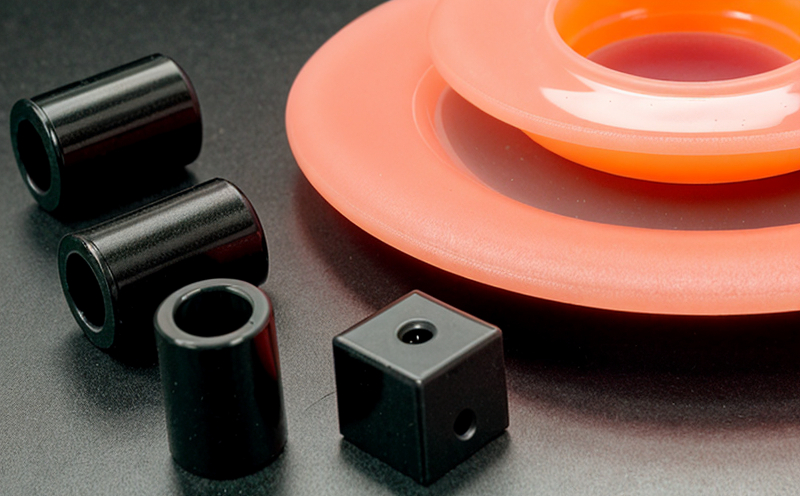JIS K 7191 Flexural Testing of Plastic Sports Plastics
The JIS K 7191 standard is a widely recognized framework that specifies procedures for determining flexural properties of plastic materials. Within this context, the focus on Flexural Testing of Plastic Sports Plastics (JIS K 7191) aims to evaluate the mechanical integrity and performance of plastics used in sports equipment and leisure products.
This testing is crucial because it ensures that the materials meet stringent requirements for durability, resilience, and safety. The test measures how a plastic specimen bends under load, providing insights into its stress-strain behavior at various points along the bend. This information helps manufacturers select appropriate materials for their products, ensuring they can withstand the rigors of use in sports and leisure settings.
The testing process involves several key steps:
- Material selection: Choosing a plastic sample that closely resembles the final product's material composition.
- Specimen preparation: Cutting or shaping the plastic into a standard flexural test bar as per JIS K 7191 specifications.
- Loading and testing: Applying a gradually increasing load to observe how the specimen bends. This is typically done using an Instron universal testing machine, which can measure force and displacement accurately.
Understanding the flexural properties of sports plastics is vital for several reasons:
- To ensure compliance with international standards like JIS K 7191.
- To enhance product durability and safety, which are critical in high-stress environments such as sports equipment.
- To improve the design of products by identifying materials that can withstand specific stresses without breaking or deforming excessively.
The results from this testing provide valuable data for quality managers, compliance officers, R&D engineers, and procurement teams. It helps them make informed decisions about material selection and process optimization.
| Test Parameter | Description |
|---|---|
| Flexural Modulus (E) | The ratio of stress to strain in a material under flexural load, indicating its stiffness. |
| Flexural Strength | The maximum stress that the specimen can withstand before breaking. |
| Deflection at Yield Point | The point where plastic deformation begins, indicating material yielding behavior. |
These parameters are crucial for evaluating the performance of sports plastics. For example, a high flexural modulus suggests a stiffer and potentially more durable product, while higher flexural strength indicates better resistance to breakage under stress.
The application of JIS K 7191 in sports and leisure plastics testing ensures that materials used in products like tennis rackets, golf clubs, and fitness equipment meet the necessary performance standards. This is especially important for high-impact activities where material failure could lead to injuries or product recalls.
Applied Standards
The JIS K 7191 standard is integral to the testing of plastic sports plastics, ensuring that materials meet specific mechanical property requirements. This standard defines the methods for determining flexural properties such as flexural modulus and flexural strength.
JIS K 7191 specifies the dimensions and conditions required for conducting flexural tests on plastic materials. The standard provides a detailed procedure for preparing specimens, applying loads, and measuring deflections to determine the mechanical behavior of plastics under bending stress.
Compliance with JIS K 7191 is essential for manufacturers in the sports and leisure industry, as it ensures that their products meet international quality standards. This compliance helps in maintaining a good reputation among consumers who value safety and performance in their sporting equipment.
Customer Impact and Satisfaction
- Enhanced Product Quality: By adhering to JIS K 7191, manufacturers can ensure that their products meet the required mechanical specifications, leading to higher customer satisfaction.
- Increased Safety: Testing according to this standard helps in identifying materials that are safe and reliable for use in sports equipment, reducing the risk of injury.
- Improved Reputation: Compliance with international standards enhances a company's reputation among consumers who prioritize quality and safety in their purchases.
The results from JIS K 7191 flexural testing provide valuable insights into the mechanical properties of plastic sports plastics. This information is crucial for ensuring that products meet the necessary performance criteria, thereby enhancing customer satisfaction and trust.
Use Cases and Application Examples
- Golf Clubs: Testing golf club shafts to ensure they can withstand high impact forces without breaking or deforming excessively.
- Tennis Rackets: Evaluating the flexural properties of tennis racket frames to guarantee durability and optimal performance under stress.
| Use Case | Description |
|---|---|
| Fitness Equipment Handles: | Evaluating the flexural properties of handles in exercise equipment to ensure they can withstand frequent use without breaking. |
| Skis and Snowboards: | Determining the flexural strength of ski poles or snowboard bases for durability during prolonged use. |
The application of JIS K 7191 in these areas ensures that materials used are suitable for their intended applications, thereby enhancing product performance and reliability.





